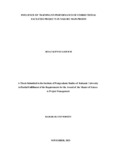INFLUENCE OF TRAINING ON PERFORMANCE OF CORRECTIONAL FACILITIES PROJECTS IN NAKURU MAIN PRISON
Abstract
Correctional facilities play a crucial role in maintaining law and order within society. They serve as institutions where individuals convicted of crimes are incarcerated, rehabilitated, and ideally, reintegrated into society as law-abiding citizens. Project performance measures are crucial indicators of the effectiveness of correctional facilities like Nakuru Prisons therefore the study sought to evaluate the impact of training on success of correctional facilities projects in Nakuru main prison. Specifically, the study sought to assess the influence of entrepreneurial skills, managerial skills, technical skills and marketing skills on the success of correctional facilities projects in Nakuru Main prison. The investigation was guided by Bandura's theory of self-efficacy, training needs assessment theory, project management competency theory and the human capital theory. The study adopted descriptive research design. The targeted population was 52 officers in Nakuru Main prison. The investigation adopted census technique to incorporate all the 52 targeted officers. The study used primary data which was collected through questionnaire. The pilot study was conducted in Naivasha Maximum Prison. Information was evaluated using expressive and inferential figures using Statistical Package for Social Sciences version 24. Expressive statistics involved the use of measures of central tendencies (mean) and measures of dispersion. Inferential statistics involved the use of correlation and regression analysis to establish the nature of relationship between study variables. After analysis data was presented in form of a table. From the findings the study concluded that entrepreneurial skills have a statistically significant influence on the performance of correctional facilities projects in Nakuru main prison (r = 0.443; p < 0.05). In addition, the study concluded that managerial skills have a statistically significant influence on the performance of correctional facilities projects in Nakuru main prison (r = 0.441; p < 0.05). Further the investigation concluded that technical skills have statistically significant influence on the performance of correctional facilities projects in Nakuru main prison (r = 0.541; p < 0.05). Finally, the study concluded that marketing skills has statistically significant influence on the performance of correctional facilities projects in Nakuru main prison (r = 0.641; p < 0.05). From the findings, the study recommended that the Department of correctional services in Kenya can take several measures to equip administrators in correctional facilities with essential skills that will enhance the performance of correctional facilities projects. For entrepreneurial skills, the department can develop training programs aimed at instilling an entrepreneurial mindset within correctional facilities. To strengthen managerial skills, the department should consider conducting leadership and management training programs. These programs can help administrators develop effective leadership, team-building, conflict resolution, and strategic planning skills. Regarding technical skills, it is essential to provide administrators with relevant training based on the specific projects within correctional facilities. For instance, if construction projects are underway, administrators should receive training in construction management, quality control, and safety procedures.

